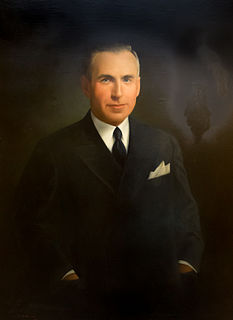A Quote by Joseph Addison
The Fashionable World is grown free and easie; our Manners sit more loose upon us: Nothing is so modish as an agreeable Negligence. In a word, Good Breeding shows it self most, where to an ordinary Eye it appears the least.
Related Quotes
Thousands of Americans, Englishmen and Frenchmen have visited Germany during the months after the national revolution and were able to testify as eye-witnesses that there is no country in the world where law and order are better maintained than in present-day Germany. That there is no country in the world where person and property are held in better respect than in our own, but that there is perhaps also no country in the word where a more rigorous fight is put up against those who believe that they are free to let loose their lower instincts to the detriment of their fellow-beings.
That which you or I think is most unique about ourselves we hide. In ordinary discourse, in the normal state, we share our common self, our superficial self. Yet what is most unique about us is what has the greatest potential for bonding us. When we share our uniqueness, we discover the commonality in greatness that defines everyone on the planet.
Nearly all our ills are the result of neglect in some way or other. And this truth may be said to apply to the ills of nations as well. Negligence is at the bottom of all decay. And decay always starts by showing little signs-or warnings. Then is the time to show interest and to be alert. There is nothing quite so easy as to neglect, and nothing quite so difficult as to repair that negligence. Negligence always carries a high price. It costs nothing to avoid it!
how wearisom Eternity so spent in worship paid To whom we hate. Let us not then pursue By force impossible, by leave obtain'd Unacceptable, though in Heav'n, our state Of splendid vassalage, but rather seek Our own good from our selves, and from our own Live to our selves, though in this vast recess, Free, and to none accountable, preferring Hard liberty before the easie yoke Of servile Pomp
Grace is the good pleasure of God that inclines him to bestow benefits upon the undeserving. It is a self-existent principle inherent in the divine nature and appears to us as a self-caused propensity to pity the wretched, spare the guilty, welcome the outcast, and bring into favor those who were before under just disapprobation. Its use to us sinful men is to save us and make us sit together in heavenly places to demonstrate to the ages the exceeding riches of God's kindness to us in Christ Jesus.
This country of ours has more wealth than any nation, but that's not what makes us rich. We have the most powerful military on Earth, but that's not what makes us strong. Our universities and our culture are the envy of the world, but that's not what keeps the world coming to our shores. Instead, it is that American spirit - that American promise - that pushes us forward even when the path is uncertain; that binds us together in spite of our differences; that makes us fix our eye not on what is seen, but what is unseen, that better place around the bend.
Without any censorship, in the West fashionable trends of thought and ideas are carefully separated from those which are not fashionable; nothing is forbidden, but what is not fashionable will hardly ever find its way into periodicals or books or be heard in colleges. Legally your researchers are free, but they are conditioned by the fashion of the day.
We live less than the time it takes to blink an eye, if we measure our lives against eternity. So it may be asked what value is there to a human life. There is so much pain in the world. What does it mean to have to suffer so much, if our lives are nothing more than the blink of an eye?...I learned a long time ago, Reuven, that a blink of an eye in itself is nothing; but the eye that blinks, that is something.
There seems no intrinsic reason why everyone shouldn't be (self-actualising). Apparently every baby has possibilities for self-actualisation, but most get it knocked out of them ...I think of the self-actualising man not as an ordinary man with something added, but rather as the ordinary man with nothing taken away.




































